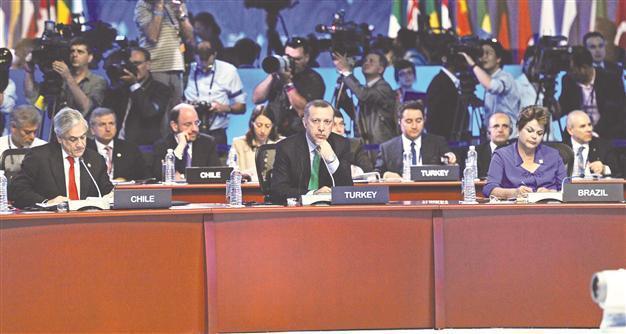Turkey pledges $5 billion for IMF coffers against crisis
LOS CABOS

Turkish Prime Minister Recep Tayyip Erdoğan
(C) participates in the first session of the G-20
meeting in Mexico. AA photo
Turkey will contribute $5 billion to the International Monetary Fund’s (
IMF) financial pool to fight the ongoing economic crisis, according to sources from the prime ministry, as the country’s weight in the fund is set to increase with an increasing quota and representation.
Prime Minister Recep Tayyip Erdoğan announced at a meeting on the first day of G-20 summit in Los Cabos, Mexico, that the figure would be $5 billion, the the Anatolia news agency reported. The fund will be provided from the foreign exchange reserve of the Central Bank, with bank officials to reveal technical details later, according to sources. Turkey will also be able to withdraw this money from the financial pool if necessary. The Central Bank said yesterday that the contribution will be counted of Turkey’s international reserves at the IMF. The total reserves of the Central Bank stood at around $92 billion as of June 8, according to the bank’s data.
Other countries that revealed how much they would contribute to the pool include China with $43 billion, Brazil with $10 billion, Russia with $10 billion, India with $10 billion, South Africa with $2 billion, Mexico with $10 billion and Colombia with $1.5 billion.
“These resources [will be] available through bilateral loan or note purchase agreements between each creditor country, or its central bank, and the IMF,” according to the web site of the IMF.
The Turkish Parliament approved on May 24 quota increases as part of suggested reforms to the IMF. Turkey’s share in the IMF’s financial resources will rise to 0.98 percent from 0.61 percent, and its Special Drawing Rights (SDR) will rise from 1.4 billion to 4.7 billion when the reform process ends.
Addressing the first session of the G-20 summit, Erdoğan said he expected 2012 to be better year for the global economy, following the commitments made at the G-20 Summit in Cannes last year. “National policies can fall short in achieving strong and sustainable growth. I would like to underline that
countries with systemic importance in particular should establish policies that take spillover effects into consideration. In our experience, credible medium-term programs were put forth that proved key in minimizing the effects of the crisis,” he said, according to the Anatolia news agency. He urged the E.U. to take quick steps to iron out structural problems.
Hollande agrees with Merkel
François Hollande said yesterday that he and German Chancellor Angela Merkel were both aware that the eurozone needed to come up with its own solutions to solve the bloc’s debt crisis rather than seek outside help.
“We can have differing points of view ... but Mrs. Merkel and I know that Europe must have its own response,” he told journalists at a G-20 meeting. “It must not be given to us from the outside.” “The IMF is not there to backstop the euro zone even if it has done so for some countries, as we saw in Greece,” he added.
“We especially see the risks and uncertainties in Europe continuing. ... Also, the high level and volatility of energy prices continues to pose a threat against the global economy. I see this summit as an opportunity to firmly establish policies and commitments to tackle these problems,” he said.
He also attended the B-20 Business Summit, where he reiterated the official target to increase the Turkish trade volume to $1 trillion, $500 billion in exports and $500 billion in imports.
The prime minister is scheduled to attend the Rio+20 United Nations Conference on Sustainable Development after the G-20 meetings. Turkey and Brazil will there ink agreements to increase the bilateral trade volume, which is currently at $2 billion.
